Text



"Those people are too kind for their own good. It's going to get them killed."
2K notes
·
View notes
Text
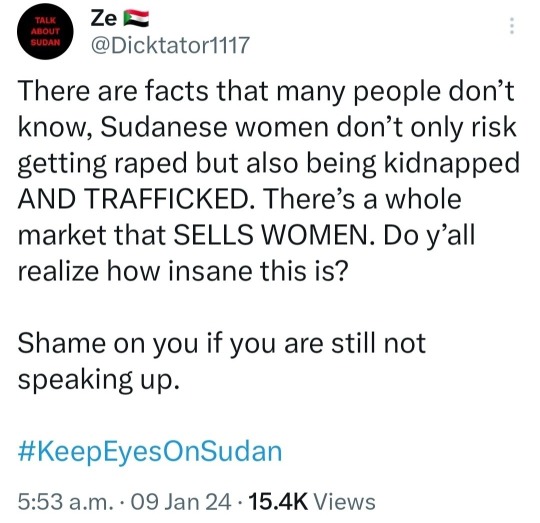

I've said this many times before -if you call yourself a feminist and you're silent about ANY person being oppressed around the world by violent dictators/regimes/governments (among many injustices) you're not a feminist. If your feminism isn't intersectional, it's not feminism -it's white feminism. If you don't know about or aren't talking about Sudan and the rampant sexual violence against Sudanese women by a terrorist genocidal militia -then GET TO KNOW and start talking about it because this is horrifying. I'm so tired of seeing mostly white women come to the frontlines of issues when it only benefits or impacts them. I'm beyond embarrassed for you.
5K notes
·
View notes
Text
Welcome to dyadic adventures
It's a series that i decided to make after being so sick of dyadics not taking intersex people & our experiences into consideration.
On the first episode we have trans spaces who don't realize that not everyone is dyadic and therefore have different trans experiences then their run of the mill trans dyadic-ness.
Dear Dyadic trans people,
Some people are both a trans man and a trans woman; some people are both transmasc and transfem; and/or they're just have the experiences of being treated as a man and a woman in society or something entirely . It's not your place as a dyadic person, someone who will never understand how being intersex impacts some of our understanding of life & our complex relationship with the binary world. So please leave us alone with our labels. We're not "really a man" or "really a woman" We're fucking what we say we are. Yes, that means that some of us are only cis. Yes, that means that some of us are trans. Yes, that means that some of us are trans and cis. And that even means that some of us are both and more. And it even means that some of us are none of the above.
We all know and understand that gender is complicated; so why is it hard to see that being intersex may make it more complex?
Signed,
A tired transcis intersex person
35 notes
·
View notes
Text
well if bitches want to act cute this morning i'm gonna be fucking adorable. you want to talk about zionism? let's talk about what zionism is at its core bc i'm sick of people arguing there are versions of it that are justified and i'm fucking pissed off
zionism is a movement that advocates for the existence of a jewish state for the jewish people. currently the jewish state is in palestine, which was where we lived before our expulsion almost 2000 years ago, but other propositions for the location of a jewish state have included uganda, madagascar, and mussolini's "italian east africa" (esp. ethiopia.) there were biblical and historical reasons palestine was a candidate, of course, but the primary reason it "won" was it suited british colonial interests. it could, to quote the first british governor of jerusalem, "[form] for England 'a little loyal Jewish Ulster' in a sea of potentially hostile Arabism." as the british empire fell, what became the state of israel was picked up by the united states as a similarly loyal buffer against communism in the middle east
but those are ugly little ulterior motives, aren't they? and as loathsome as the zionist project is to me as a jew myself, i'm not going to pretend i don't understand that escape from antisemitism—particularly in the wake of the shoah—was a bigger motivation for a lot of zionist jews than furthering british and american imperialism. so, let's take jewish zionists at their word and go through why their most common arguments still fucking suck. i'm going to read the arguments in good faith, but that doesn't mean i'm going to mince words or coddle anyone's deeply-held beliefs in the face of an active, ongoing genocide. the only reason i'm even talking about the zionist perspective is y'all keep trying to pick fights and i want you to know how empty, callous, and self-absorbed your ideology is
i'm also not going to argue outside of what i've written below. if you comment i'll just block you, and if you make another post i'm not gonna read it. i don't care. you don't get the benefit of the doubt when your beliefs have led to a genocide
this post is excessively long because i'm angry as fuck and this is more of a vent than a persuasive essay. i'll be pleasantly surprised if it does any good, but i doubt it and i just need to scream so meh. now, click that read more and let's get this over with
the jewish people have a right to self-determination and a national homeland
oh my god woodrow wilson is that you?? shouldn't you be at the big birth of a nation screening in the sky?
i see a bizarre number of people citing this argument and it takes everything in me not to ask if i can see the cool steampunk time machine they must have just stepped out of. have 200 years of big world wars and small, horrible civil wars taught us nothing about nationalism? you can't build an ethnostate without kicking off a cycle of violence that ends in somebody's genocide. palestine wasn't a "land without a people" before the british colonized it, it was a colony of the ottoman empire that as a matter of fact had a delegation present at the treaty of versailles where wilson presented his famous fourteen points
see the thing about national self-determination is it sounds nice in theory, but human migration is a complicated thing and we tend to imagine borders being more solid than they actually are. you only have to look at violent processes like the partition of india or the places where america's southern border divided pre-existing mexican communities. prioritizing the sovereignty of people who belong to/are represented by nation states also inherently subjugates nomadic peoples and peoples whose self-government is more decentralized than the west is used to
if people are coming to israel to flee antisemitism, shouldn't we act in solidarity with people who don't have colonial interests propping up a state for them? do we not owe solidarity to our romani brethren who suffered nazi atrocities with us, or the first peoples of north america who were forced onto reservations that went on to inspire hitler's camps? does our suffering make it okay to do the same thing to palestinians now? or ugandans? ethiopians? malagasy? how would you have justified a jewish homeland if it hadn't ended up being palestine? borders and nations are concepts we made up that are maintained through violence. nobody has a right to one, especially at the expense of other people
jews need a homeland because we aren't safe anywhere else
how convenient for the antisemites! did you know that the government of arthur balfour of balfour declaration fame limited jewish immigration to great britain in the 1905 aliens act in response to us fleeing pogroms in the russian empire? it was the nazis who considered madagascar and they literally visited palestine to weigh whether expelling jews to the holy land was an adequate final solution to the jewish problem. hell, there were zionist fascists willing to work with the nazis and mussolini because they felt they had interests in common. (that link goes to a haaretz article, btw. i've even linked an unpaywalled version so you can all see a mainstream israeli source talk about this)
furthermore, we've made the world just as unsafe for palestinians by taking land they occupied for thousands of years while we were gone. zionists can argue all they like that muslims have ~plenty of countries for palestinians to go to~ but muslims aren't a monolith anymore than jews are. although y'all desperately want every jew to fall in line with zionism so idk why i'm bothering to argue that
either way, that argument ignores that occupying palestinian land for jews to settle pushes palestinians by the millions into countries that aren't prepared to host a refugee population or who simply don't feel obligated to treat them with any respect or humanity. that includes neighboring countries like jordan, lebanon, and syria as well as the very european countries jews have fled in the first place. ESPECIALLY when you take the syrian refugee crisis into account. how many of those people were only in syria because their parents and grandparents were pushed there by the nakba?
but what happens to the jews of israel if we give palestinians autonomy?
look, i understand that a lot of us freeze up at the thought of jewish expulsion or a potential genocide of jews. antisemitism is real and dangerous, and like most jews i've seen plenty of it in leftist and anti-zionist spaces. while "what if the people we're oppressing retaliate" is a tired old white supremacist talking point, jews have historically gotten retaliation for shit we literally didn't even do. europe has exported its particular brand of antisemitism to the middle east, and while i don't believe the majority of palestinians would seek revenge against people just for being jewish, i also know that antisemites don't need majority support to pull off pogroms
but that doesn't justify israel staying its current course. zionist violence against palestinians is already fueling retaliation against jews in the diaspora whether we support what's happening or not. it's to the point now that every time israel starts bombing gaza again, i start to fear for my own safety here in the united states. furthermore, palestinians living in diaspora share the same fear and experience the same level of retaliatory violence because they've been forced to be strangers in strange lands too. what about them? what about us?
and most importantly, what about the people in palestine trying to cling to what's left of their homeland? why, because we've suffered at the hands of imperial powers, do we get to use today's empires to do the same thing to palestinians that the romans did to us? if israel stays on its current path, the only place this can end is in genocide. do we as a people really want that on our hands? do we want to see what happens when the west turns on us again and has our self-designated leaders' hypocrisy to wield against us?
i don't doubt that there are antisemites among the ranks of the palestinian people; just look how many racist islamophobes we jews have in our own communities. i've also seen plenty of palestinians and other anti-zionists acknowledge that jews had completely non-colonial reasons to flee to palestine, that mizrahi jews have existed in palestine forever, that we're being used by forces of white supremacy that don't actually give a shit about us as people
because that's the thing—they don't. we can't colonize our way into unconditional whiteness, and considering the dominance of white ashkenazim in israel i don't think it's a stretch to argue that that's what the zionist national project ultimately is. the west will abandon israel the second it's convenient, and all the jews living there will have left to rely on is the mercy of people who were forced out of their homes on their behalf. israel can bomb gaza until it's flattened like the warsaw ghetto before it, but we've seen what happens when you try to eradicate an entire people to create living space for a Folk who feel entitled to it. is that seriously the future you want for the jewish people? i leave the logistics of decolonization to the colonized, but as a jew i feel confident saying i don't want that done in my name
and it doesn't have to come to that. jews all over the world, both across the diaspora and within israel itself, are waking up to the hypocrisy and cruelty of the zionist project. jews are building community and solidarity with palestinian people, calling out our parents and grandparents who've looked the other way for too damn long, and reconnecting with the thousands of years of language and culture built in diaspora that the zionist movement saw fit to discard as a relic of jewish oppression in order to rebuild a rich, healthy, and just judaism that doesn't define itself by the conquest of others
solidarity with the palestinian people. from the river to the sea, if there's any justice in this world, one day soon you'll all be free
1K notes
·
View notes
Text
hey! disability advocates, i would appreciate it if yall read this. especially if it is uncomfortable for you to hear.
there is always someone who needs more support than you.
this does not mean that you do not deserve support. this does not mean you do not deserve treatment. this does not mean that your needs should not be met.
this does mean that your struggles should not be the end to your advocacy. this does mean that if something is difficult for you, it is inaccessible for someone else. this does mean that different forms of disability need to be kept in mind when it comes to advocating for accessibility.
i am extremely fortunate to be as well off as i am. my family is able to support my medical bills and can afford specialists. i can still walk with support. i can communicate verbally the vast majority of the time. i have access to mobility aids and other things that ease my struggles. im white and have reliable access to housing. i am lucky to have these and so many other things.
when you are advocating for disabled rights, always remember there are people who need various accommodations. options need to be available to people with all kinds of disabilities. being disabled is complicated, and it intersects with all sorts of marginalized groups. there is no one way to be disabled or accessible. just because something works for you, doesnt mean it works for everyone.
thank you and have a nice day.
3K notes
·
View notes
Text
yes, internalised ableism is a real thing that many disabled people grapple with. but I’ve seen a few people use the term incorrectly, so I’m just going to make something clear
if someone with POTS makes a diabetes joke, that’s not internalised ableism. that’s ableism.
if someone with ADHD steals someone’s mobility aid, that’s not internalised ableism. that’s ableism.
having one disability and being insecure about that is not an excuse to act like a dick towards other disabled people. internalised ableism explains the pressures you put on yourself. it doesn’t explain ableist behaviour that is completely unrelated to your own struggles
9K notes
·
View notes
Text
whenever people start talking about how “nonbinary people have always existed, look at all of these genders in precolonial civilisations” it is almost always bad. very rarely is it good
1K notes
·
View notes
Text
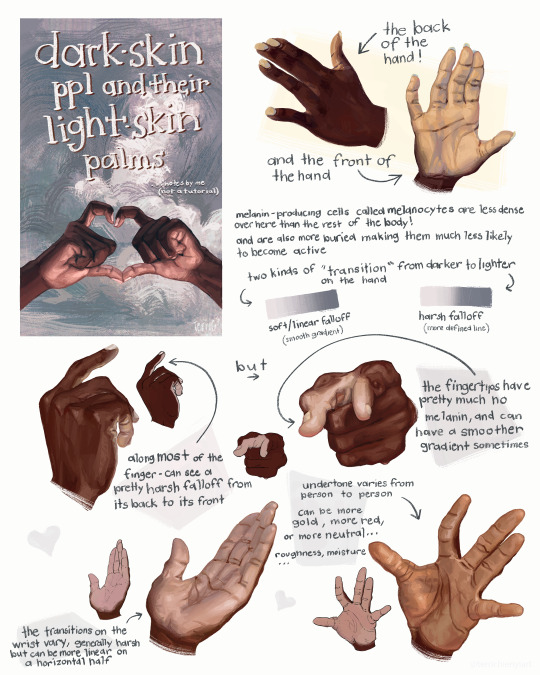
this is not a tutorial this is just me rambling
22K notes
·
View notes
Text
all goofing aside I genuinely don't understand the urge to reimagine Taylor Allison Swift as a secretly queer icon when the pop music scene(TM) is like. literally overflowing with women who actually like women. Gaga and Kesha and Miley and Halsey are right there. Rina Sawayama and Hayley Kiyoko and Rebecca Black and Kehlani and Victoria Monét and Miya Folick if you're willing to get slightly less top 100. Janelle and Demi for them nonbinary takes on liking girls. like what are we doing here. like I'm not even saying you can't enjoy Taylor but why would you hang all your little gay hopes on her.
335K notes
·
View notes
Text
Do Your Research
This phrase is regularly thrown around writeblr and for good reason. It's important to research what you are writing about to know what to include, what can be fudged, and how to depict whatever you're writing. I see "do your research" most thrown around by well-meaning and highly traditionally educated writers. It's solid advice, after all!
But how do you research?
For those writers who don't already have the research skills necessary to write something comfortably already downloaded into your brain, I put this guide together for you.
Where do I even start?
It's a daunting task, research. But the best place to start is with the most basic, stupidest question you can think of. I'm going to talk about something that I already know a lot about: fighting.
When researching fight scenes, a great way to start is to look up what different weapons are. There are tons out there! So ask the stupid questions. What is a sword? What is a gun? How heavy are they?
Google and Wikipedia can help you a lot with these basic-level questions. They aren't great sources for academic articles, but remember, this is fiction. It doesn't need to be perfect, and it doesn't need to be 100% accurate if you don't want it to be. But knowing what is true to life will help you write well. Just like knowing the rules of writing will help you break them.
You may find in your basic research sweep that you have a lot more specific questions. Write them all down. It doesn't matter if they seem obvious. Write them down because they will be useful later.
How To Use Wikipedia Correctly
Wikipedia is a testament to cooperative human knowledge. It's also easy to edit by anonymous users, which means there is a lot of room for inaccuracies and misleading information. Wikipedia is usually pretty good about flagging when a source is needed or when misleading language is obvious, but Wikipedia itself isn't always the most accurate or in-depth source.
Wikipedia is, however, an excellent collection of sources. When I'm researching a subject that I know nothing about, say Norse mythology, a good starting point is the Wikipedia page for Odin. You'll get a little background on Odin's name and Germanic roots, a little backstory on some of the stories, where they appear, and how they are told.
When you read one of the sentences, and it sparks a new question, write the question down, and then click on the superscript number. This will take you directly to the linked source for the stated fact. Click through to that source. Now you have the source where the claim was made. This source may not be a primary source, but a secondary source can still lead you to new discoveries and details that will help you.
By "source-hopping," you can find your way across the internet to different pieces of information more reliably. This information may repeat itself, but you will also find new sources and new avenues of information that can be just as useful.
You mean I don't need a library?
Use your library. Libraries in many parts of the US are free to join, and they have a wealth of information that can be easily downloaded online or accessed via hardcopy books.
You don't, however, need to read every source in the library for any given topic, and you certainly don't need to read the whole book. Academic books are different from fiction. Often their chapters are divided by topic and concept and not by chronological events like a history textbook.
For example, one of my favorite academic books about legislative policy and how policy is passed in the US, by John Kingdon, discusses multiple concepts. These concepts build off one another, but ultimately if you want to know about one specific concept, you can skip to that chapter. This is common in sociological academic books as well.
Going off of my Norse Mythology example in the last section, a book detailing the Norse deities and the stories connected to them will include chapters on each member of the major pantheon. But if I only care about Odin, I can focus on just the chapters about Odin.
Academic Articles and How To Read Them
I know you all know how to read. But learning how to read academic articles and books is a skill unto itself. It's one I didn't quite fully grasp until grad school. Learn to skim. When looking at articles published in journals that include original research, they tend to follow a set structure, and the order in which you read them is not obvious. At all.
Start with the abstract. This is a summary of the paper that will include, in about half a page to a page, the research question, hypothesis, methods/analysis, and conclusions. This abstract will help you determine if the answer to your question is even in this article. Are they asking the right question?
Next, read the research question and hypothesis. The hypothesis will include details about the theory and why the researcher thinks what they think. The literature review will go into much more depth about theories, what other people have done and said, and how that ties into the research of the present article. You don't need to read that just yet.
Skim the methods and analysis section. Look at every data table and graph included and try to find patterns yourself. You don't need to read every word of this section, especially if you don't understand a lot of the words and jargon used. Some key points to consider are: qualitative vs. quantitative data, sample size, confounding factors, and results.
(Some definitions for those of you who are unfamiliar with these terms. Qualitative data is data that cannot be quantified into a number. These are usually stories and anecdotes. Quantitative data is data that can be transferred into a numerical representation. You can't graph qualitative data (directly), but you can graph quantitative data. Sample size is the number of people or things counted (n when used in academic articles). Your sample size can indicate how generalizable your conclusions are. So pay attention. Did the author interview 300 subjects? Or 30? There will be a difference. A confounding factor is a factor that may affect the working theory. An example of a theory would be "increasing LGBTQ resources in a neighborhood would decrease LGBTQ hate crimes in that area." A confounding factor would be "increased reporting of hate crimes in the area." The theory, including the confounding factor, would look like "increasing LGBTQ resources in a neighborhood would increase the reporting of hate crimes in the area, which increases the number of hate crimes measured in that area." The confounding factor changes the outcome because it is a factor not considered in the original theory. When looking at research, see if you can think of anything that may change the theory based on how that factor interacts with the broader concept. Finally, the results are different from the conclusions. The results tell you what the methods spit out. Analysis tells you what the results say, and conclusions tell you what generalizations can be made based on the analysis.)
Next, read the conclusion section. This section will tell you what general conclusions can be made from the information found in the paper. This will tell you what the author found in their research.
Finally, once you've done all that, go back to the literature review section. You don't have to read it necessarily, but reading it will give you an idea of what is in each sourced paper. Take note of the authors and papers sourced in the literature review and repeat the process on those papers. You will get a wide variety of expert opinions on whatever concept or niche you're researching.
Starting to notice a pattern?
My research methods may not necessarily work for everybody, but they are pretty standard practice. You may notice that throughout this guide, I've told you to "source-hop" or follow the sources cited in whatever source you find first. This is incredibly important. You need to know who people are citing when they make claims.
This guide focused on secondary sources for most of the guide. Primary sources are slightly different. Primary sources require understanding the person who created the source, who they were, and their motivations. You also may need to do a little digging into what certain words or phrases meant at the time it was written based on what you are researching. The Prose Edda, for example, is a telling of the Norse mythology stories written by an Icelandic historian in the 13th century. If you do not speak the language spoken in Iceland in 1232, you probably won't be able to read anything close to the original document. In fact, the document was lost for about 300 years. Now there are translations, and those translations are as close to the primary source you can get on Norse Mythology. But even then, you are reading through several veils of translation. Take these things into account when analyzing primary documents.
Research Takes Practice
You won't get everything you need to know immediately. And researching subjects you have no background knowledge of can be daunting, confusing, and frustrating. It takes practice. I learned how to research through higher formal education. But you don't need a degree to write, so why should you need a degree to collect information? I genuinely hope this guide helps others peel away some of the confusion and frustration so they can collect knowledge as voraciously as I do.
– Indy
2K notes
·
View notes
Text
A general cane guide for writers and artists (from a cane user, writer, and artist!)
Disclaimer: Though I have been using a cane for 6 years, I am not a doctor, nor am I by any means an expert. This guide is true to my experience, but there are as many ways to use a cane as there are cane users!
This guide will not include: White canes for blindness, crutches, walkers, or wheelchairs as I have no personal experience with these.
This is meant to be a general guide to get you started and avoid some common mishaps/misconceptions in your writing, but you absolutely should continue to do your own research outside of this guide!
This is NOT a medical resource!!! And never tell a real person you think they're using a cane wrong!
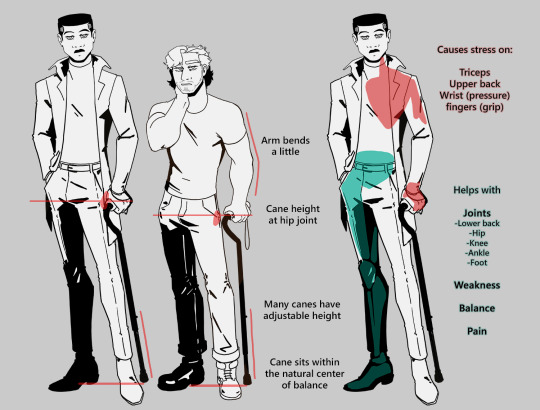
The biggest recurring problem I've seen is using the cane on the wrong side. The cane goes on the opposite side of the pain! If your character has even-sided pain or needs it for balance/weakness, then use the cane in the non-dominant hand to keep the dominant hand free. Some cane users also switch sides to give their arm a rest!
A cane takes about 20% of your weight off the opposite leg. It should fit within your natural gait and become something of an extension of your body. If you need more weight off than 20%, then crutches, a walker, or a wheelchair is needed.
Putting more pressure on the cane, using it on the wrong side, or having it at the wrong height can make it less effective, and can cause long term damage to your body from improper pressure and posture. (Hugh Laurie genuinely hurt his body from years of using a cane wrong on House!)
(some people elect to use a cane wrong for their personal situation despite this, everyone is different!)
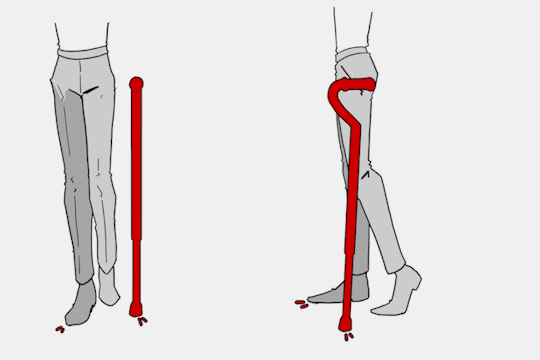
(an animated GIF of a cane matching the natural walking gait. It turns red when pressure is placed on it.)
When going up and down stairs, there is an ideal standard: You want to use the handrail and the cane at the same time, or prioritize the handrail if it's only on one side. When going up stairs you lead with your good leg and follow with the cane and hurt leg together. When going down stairs you lead with the cane and the bad leg and follow with the good leg!
Realistically though, many people don't move out of the way for cane users to access the railing, many stairs don't have railings, and many are wet, rusty, or generally not ideal to grip.
In these cases, if you have a friend nearby, holding on to them is a good idea. Or, take it one step at a time carefully if you're alone.
Now we come to a very common mistake I see... Using fashion canes for medical use!
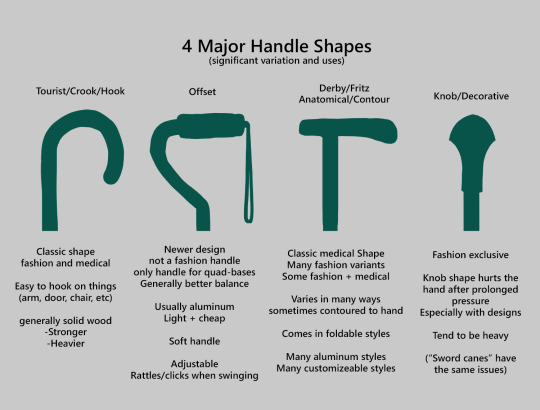
(These are 4 broad shapes, but there is INCREDIBLE variation in cane handles. Research heavily what will be best for your character's specific needs!)
The handle is the contact point for all the weight you're putting on your cane, and that pressure is being put onto your hand, wrist, and shoulder. So the shape is very important for long term use!
Knob handles (and very decorative handles) are not used for medical use for this reason. It adds extra stress to the body and can damage your hand to put constant pressure onto these painful shapes.
The weight of a cane is also incredibly important, as a heavier cane will cause wear on your body much faster. When you're using it all day, it gets heavy fast! If your character struggles with weakness, then they won't want a heavy cane if they can help it!
This is also part of why sword canes aren't usually very viable for medical use (along with them usually being knob handles) is that swords are extra weight!
However, a small knife or perhaps a retractable blade hidden within the base might be viable even for weak characters.
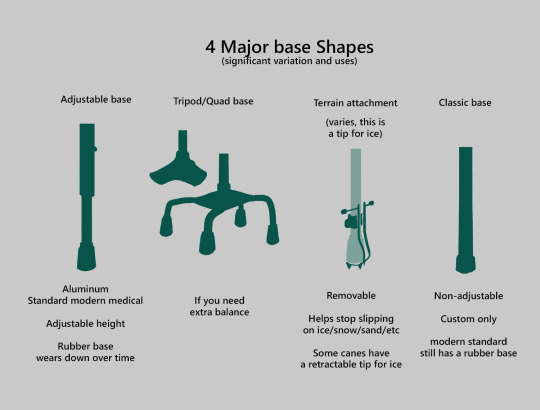
Bases have a lot of variability as well, and the modern standard is generally adjustable bases. Adjustable canes are very handy if your character regularly changes shoe height, for instance (gotta keep the height at your hip!)
Canes help on most terrain with their standard base and structure. But for some terrain, you might want a different base, or to forego the cane entirely! This article covers it pretty well.
Many cane users decorate their canes! Stickers are incredibly common, and painting canes is relatively common as well! You'll also see people replacing the standard wrist strap with a personalized one, or even adding a small charm to the ring the strap connects to. (nothing too large, or it gets annoying as the cane is swinging around everywhere)
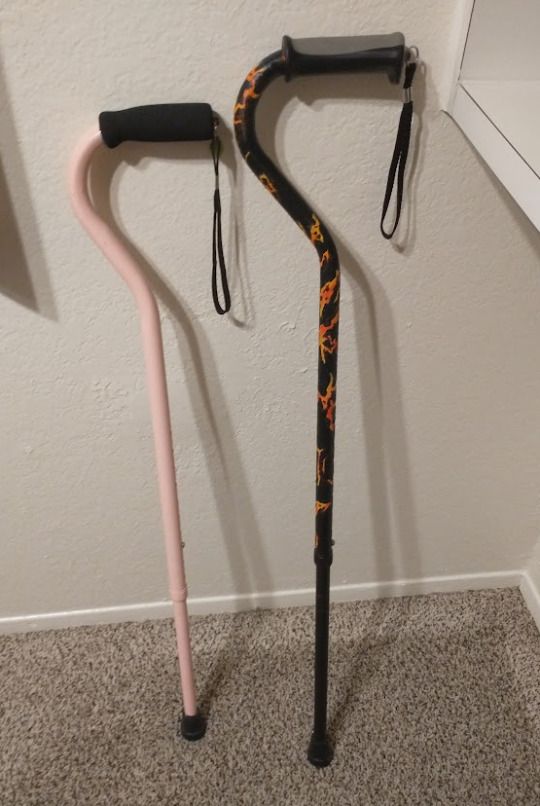
(my canes, for reference)
If your character uses a cane full time, then they might also have multiple canes that look different aesthetically to match their outfits!
When it comes to practical things outside of the cane, you reasonably only have one hand available while it's being used. Many people will hook their cane onto their arm or let it dangle on the strap (if they have one) while using their cane arm, but it's often significantly less convenient than 2 hands. But, if you need 2 hands, then it's either setting the cane down or letting it hang!
For this reason, optimizing one handed use is ideal! Keeping bags/items on the side of your free hand helps keep your items accessible.
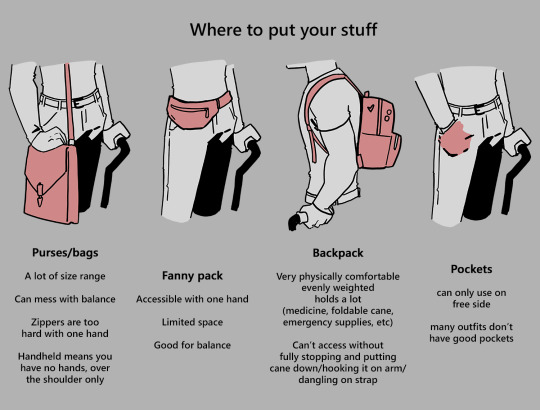
When sitting, the cane either leans against a wall or table, goes under the chair, or hooks onto the back of the chair. (It often falls when hanging off of a chair, in my experience)
When getting up, the user will either use their cane to help them balance/support as they stand, or get up and then grab their cane. This depends on what it's being used for (balance vs pain when walking, for instance!)
That's everything I can think of for now. Thank you for reading my long-but-absolutely-not-comprehensive list of things to keep in mind when writing or drawing a cane user!
Happy disability pride month! Go forth and make more characters use canes!!!
89K notes
·
View notes
Text
WEBSITES FOR WRITERS {masterpost}
E.A. Deverell - FREE worksheets (characters, world building, narrator, etc.) and paid courses;
NotionByRach - FREEBIES (workbook, notion template, games, challenges, etc.);
Hiveword - Helps to research any topic to write about (has other resources, too);
BetaBooks - Share your draft with your beta reader (can be more than one), and see where they stopped reading, their comments, etc.;
Charlotte Dillon - Research links;
Writing realistic injuries - The title is pretty self-explanatory: while writing about an injury, take a look at this useful website;
One Stop for Writers - You guys... this website has literally everything we need: a) Description thesaurus collection, b) Character builder, c) Story maps, d) Scene maps & timelines, e) World building surveys, f) Worksheets, f) Tutorials, and much more! Although it has a paid plan ($90/year | $50/6 months | $9/month), you can still get a 2-week FREE trial;
One Stop for Writers Roadmap - It has many tips for you, divided into three different topics: a) How to plan a story, b) How to write a story, c) How to revise a story. The best thing about this? It's FREE!
Story Structure Database - The Story Structure Database is an archive of books and movies, recording all their major plot points;
National Centre for Writing - FREE worksheets and writing courses. Has also paid courses;
Penguin Random House - Has some writing contests and great opportunities;
Crime Reads - Get inspired before writing a crime scene;
The Creative Academy for Writers - "Writers helping writers along every step of the path to publication." It's FREE and has ZOOM writing rooms;
Reedsy - "A trusted place to learn how to successfully publish your book" It has many tips, and tools (generators), contests, prompts lists, etc. FREE;
QueryTracker - Find agents for your books (personally, I've never used this before, but I thought I should feature it here);
Pacemaker - Track your goals (example: Write 50K words - then, everytime you write, you track the number of the words, and it will make a graphic for you with your progress). It's FREE but has a paid plan;
Save the Cat! - The blog of the most known storytelling method. You can find posts, sheets, a software (student discount - 70%), and other things;
I hope this is helpful for you!
☕️ buy me a coffee! ☕️
73K notes
·
View notes
Text
Skip Google for Research
As Google has worked to overtake the internet, its search algorithm has not just gotten worse. It has been designed to prioritize advertisers and popular pages often times excluding pages and content that better matches your search terms
As a writer in need of information for my stories, I find this unacceptable. As a proponent of availability of information so the populace can actually educate itself, it is unforgivable.
Below is a concise list of useful research sites compiled by Edward Clark over on Facebook. I was familiar with some, but not all of these.
⁂
Google is so powerful that it “hides” other search systems from us. We just don’t know the existence of most of them. Meanwhile, there are still a huge number of excellent searchers in the world who specialize in books, science, other smart information. Keep a list of sites you never heard of.
www.refseek.com - Academic Resource Search. More than a billion sources: encyclopedia, monographies, magazines.
www.worldcat.org - a search for the contents of 20 thousand worldwide libraries. Find out where lies the nearest rare book you need.
https://link.springer.com - access to more than 10 million scientific documents: books, articles, research protocols.
www.bioline.org.br is a library of scientific bioscience journals published in developing countries.
http://repec.org - volunteers from 102 countries have collected almost 4 million publications on economics and related science.
www.science.gov is an American state search engine on 2200+ scientific sites. More than 200 million articles are indexed.
www.pdfdrive.com is the largest website for free download of books in PDF format. Claiming over 225 million names.
www.base-search.net is one of the most powerful researches on academic studies texts. More than 100 million scientific documents, 70% of them are free
240K notes
·
View notes
Text
whenever i see clark kent from my adventures with superman i get up and jump and dance around like an excited teenage girl
0 notes



